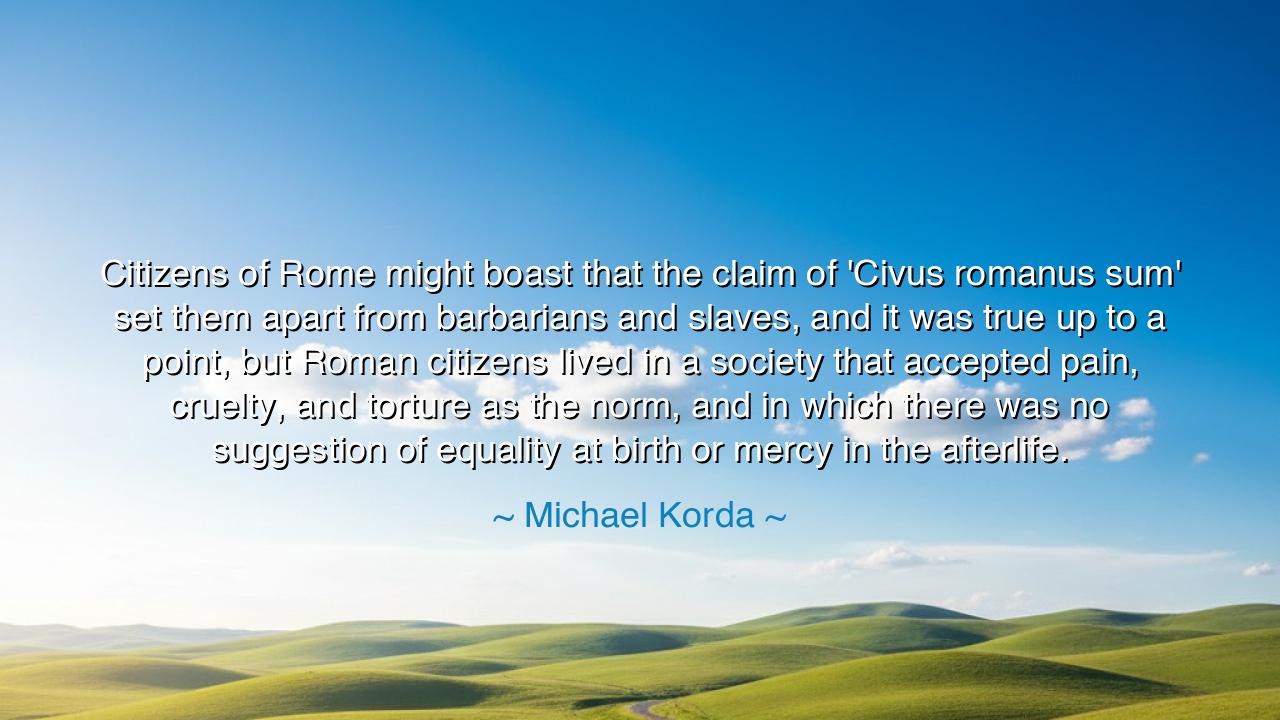
Citizens of Rome might boast that the claim of 'Civus romanus
Citizens of Rome might boast that the claim of 'Civus romanus sum' set them apart from barbarians and slaves, and it was true up to a point, but Roman citizens lived in a society that accepted pain, cruelty, and torture as the norm, and in which there was no suggestion of equality at birth or mercy in the afterlife.






In the words of Michael Korda, “Citizens of Rome might boast that the claim of ‘Civis romanus sum’ set them apart from barbarians and slaves, and it was true up to a point, but Roman citizens lived in a society that accepted pain, cruelty, and torture as the norm, and in which there was no suggestion of equality at birth or mercy in the afterlife.” These words pierce the veil of Roman grandeur and reveal the harsher truth beneath the marble and triumphs. To be a Roman citizen was to bear privilege, yes—but it was privilege built upon the suffering of others, sustained by laws that divided rather than united, and by a worldview that offered little hope of universal dignity.
The ancients revered the phrase “Civis romanus sum”—“I am a Roman citizen”—as a shield of power. It was a declaration that one belonged to the empire’s ruling class, entitled to rights, to justice, and to protection. To utter it in foreign lands could stay the whip, delay execution, or command respect. And yet, as Korda reminds us, this cry of superiority was only for the few. Beneath the splendor of the forums and the thunder of the legions lay a vast multitude—slaves, conquered peoples, women, and the poor—for whom citizenship was an unattainable dream, and whose suffering made the comfort of citizens possible.
We must remember, too, that cruelty was not hidden in Rome, but celebrated. The Colosseum, that mighty amphitheater, was filled not with plays of beauty but with the screams of men torn by beasts, and the cheers of crowds drunk on blood. Torture was an accepted instrument of law, used without shame to extract confessions. Mercy, as we understand it now, was considered weakness. The Roman citizen lived within a system that glorified conquest and hierarchy, and though he might feel superior to the “barbarian,” he himself was captive to a culture that accepted pain and cruelty as the price of greatness.
History gives us vivid examples. Consider the crucifixion of Spartacus’s followers—six thousand men lined along the Appian Way, nailed to crosses, left to rot in the sun. This was no secret atrocity; it was a public warning, a spectacle of suffering meant to enforce the Roman order. The citizen might walk proudly past those dying men, secure in his own freedom, yet blind to the truth that his security was built upon the agony of others. Korda’s words remind us that such a society, however mighty, carries within itself the seeds of decay, for no empire built on cruelty endures forever.
The deeper lesson here is that privilege without compassion is corruption. Rome offered its citizens protection, but not equality. It promised order, but not mercy. It gave its elites glory in this life, but no promise of redemption beyond the grave. Korda unveils the hollowness of such a system: what is citizenship worth if it blinds its holders to the humanity of others? What is greatness worth if it thrives only on the suffering of the powerless?
For us, the teaching is clear. Let us not mistake status for virtue, nor confuse privilege with justice. The claim “I am protected, I am favored, I belong” means little if it rests upon the exclusion or torment of others. True civilization is not measured by the strength of its armies or the wealth of its citizens, but by its recognition of equality at birth and its extension of mercy to all, even the weakest.
Practical actions flow from this wisdom. Examine the foundations of your society—do they rest upon fairness, or upon hidden cruelty? Extend compassion to the marginalized, for their suffering sustains the comfort of many. Reject the culture of cruelty in entertainment, in politics, in daily life, and instead cultivate mercy as a sign of strength. And above all, do not boast of privilege, but use it to lift others, so that no man or woman may be treated as less than human.
Thus, Korda’s words stand as a warning from history. The glory of Rome dazzled the world, but its acceptance of cruelty and denial of equality weakened its soul. Let future generations remember: greatness without mercy is hollow, and privilege without justice is fleeting. Only a society built upon compassion, equality, and respect for all can endure beyond the reach of time.






AAdministratorAdministrator
Welcome, honored guests. Please leave a comment, we will respond soon